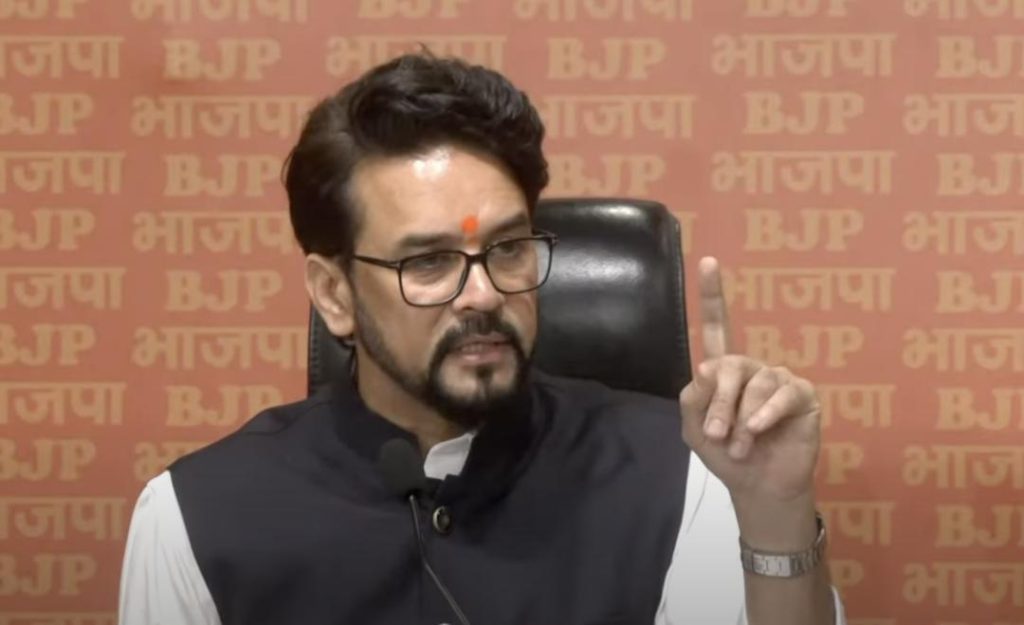
Congress & CPI made Bhimrao Ambedkar lose the poll in 1952: BJP
The Indian political landscape has witnessed numerous elections since independence, with each one leaving its mark on the country’s polity. Among the many elections that have taken place, the 1952 general election stands out for its significance, not just in terms of its outcome but also in the way it was conducted. In a recent statement, BJP MP Anurag Thakur has brought to light a shocking incident from this election, which highlights the extent to which political parties are willing to go to win power.
According to Thakur, the Congress and Communist Party of India (CPI) together conspired to defeat Dr. Bhimrao Ambedkar, the chief architect of the Indian Constitution and a stalwart leader of the Dalit community, in the 1952 election. Thakur made this claim during a recent speech, where he emphasized the need for electoral reforms to ensure free and fair elections.
For those who may not be aware, the 1952 general election was the first election held after India gained independence. It was a significant milestone in the country’s democratic journey, marking the beginning of a new era of political competition and accountability. However, as Thakur’s statement suggests, the election was marred by widespread irregularities and electoral malpractices, which ultimately led to the defeat of a prominent national leader like Dr. Ambedkar.
So, what exactly happened during the 1952 election that led to Dr. Ambedkar’s defeat? According to Thakur, the Congress and CPI colluded to deny Ambedkar the chance to win the election. This is a shocking allegation, especially considering the fact that Ambedkar was a prominent leader of the time, known for his tireless efforts to promote social justice and equality. His defeat in the election was a major blow to the Dalit community, which had seen him as a beacon of hope for their struggles.
Thakur’s statement is based on a report by the Election Commission of India, which revealed that a staggering 74,333 votes were rejected in the 1952 election. This was a massive number, considering the total number of votes cast in the election. The rejection of these votes was a result of the flawed electoral process, which was marred by irregularities and malpractices.
The 1952 election was also marked by widespread violence and intimidation, which were used by political parties to influence the outcome of the election. The Congress and CPI were two of the main parties involved in this violence, which was directed primarily against Dr. Ambedkar’s supporters. The violence and intimidation were so severe that many people were forced to flee their homes, leaving behind their livelihoods and belongings.
Dr. Ambedkar’s defeat in the 1952 election was a devastating blow to the Dalit community, which had seen him as a champion of their rights. His loss was a result of the dirty tricks played by the Congress and CPI, which were desperate to deny him the chance to win the election. The election was a sham, with the Congress and CPI using every trick in the book to influence the outcome.
The 1952 election was a turning point in Indian politics, marking the beginning of a new era of political competition and corruption. The election was marred by irregularities and malpractices, which were used by political parties to win power. The defeat of Dr. Ambedkar was a result of this dirty politics, which has continued to plague Indian politics to this day.
In conclusion, the 1952 election was a significant milestone in Indian politics, marking the beginning of a new era of political competition and corruption. The defeat of Dr. Bhimrao Ambedkar was a result of the dirty tricks played by the Congress and CPI, which were desperate to deny him the chance to win the election. The election was a sham, with the Congress and CPI using every trick in the book to influence the outcome.
As we move forward, it is essential that we learn from the mistakes of the past and work towards creating a more just and equitable society. This can only be achieved by ensuring free and fair elections, which are the lifeblood of any democracy. We must also work towards creating a political system that is based on principles of equality and justice, rather than corruption and power.
Source: https://youtu.be/0kLyW5rSJSg






